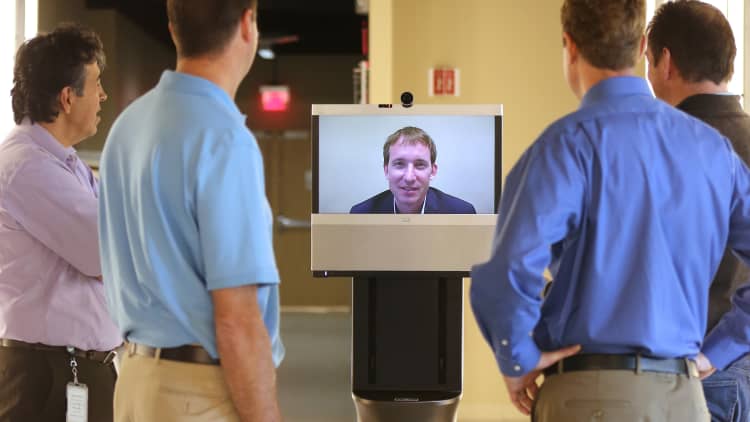Technology is upending the financial world as much as it is any industry. The most dramatic example of this is the recent arrival of the start-up digital-advice firms informally known as robo-advisors.
Although these companies are still small, they are positioning themselves to cater to the underserved population of investors who do not have large enough accounts to meet traditional wealth-management minimums.
"Robo-advisors are definitely grabbing the youth movement," said Sophie Schmitt, senior research analyst at the consultancy and research firm Aite Group.
"The mass affluent, with $250,000 to $1 million [of investable assets], can get lots of advisors to work with them," she said. "But new online tools are providing a wonderful service for those with less than $100,000 [of investable assets]."
Many of these robo-advisor firms offer basic advice and access to digital tools for free but charge for various other services, such as advice from an actual certified financial planner (online or by phone) or for rebalancing a portfolio.
Read MoreThe new normal for wealth management
For example, FlexScore, Financial Guard, Jemstep, LearnVest and SigFig deliver advice via the Web, phone and email but leave the execution or product purchase to the client, according to Schmitt.
Online investment-management players, such as Betterment, Covestor, Future Advisor, Motif Investing and Wealthfront, primarily manage the assets in model portfolios or other low-cost investment-management services remotely.
Not just Gen Y
Fees at Betterment and Wealthfront, for example, can be as low as a few dollars a month. Betterment's sliding scale shows that it charges 0.15 percent annually on assets of $100,000 or more, or from as low as about $13 a month, according to the firm's founder and CEO, Jon Stein. That compares with at least 1 percent annually, or just over $83 a month, for a full-service advisor.
And far from being impersonal and robotic, these new firms, Schmitt said, provide more "human and intuitive digital tools and services than incumbent providers do."
She added that these robo-advisors are being backed by seasoned and experienced financial and technology heavyweights, such as economist Burton Malkiel and technology guru and former PayPal and Intuit CEO Bill Harris.
Read MoreCNBC's Top 100 wealth-management firms list
By and large, robo-advisors have set out to serve the substantial number of people who can't afford a financial advisor—mostly Gen X and Gen Y investors.
Apparently, robo-advisors are also enticing an older crowd.
"We had a number of customers [who are] in or approaching retirement," Stein said.
These "older" customers make up 20 percent of the Betterment's assets under management. They are starting to ask for advice on how to spend down their assets.
To that point, Betterment expanded its online services to manage portfolios based on a client's time horizon—for example, living from 70 to 90 years of age. The calculations factor in safe spending habits and withdrawal rates.
Robo-advisors will more than likely pressure traditional advisory firms to upgrade their technology and possibly lower their fees.
Read MoreDon't pay high cost of market hype
"The ease and price compression of robo-advisors may challenge the survival of smaller and less sophisticated financial advisors," said Chip Roame, managing principal of Tiburon Strategic Advisors, a consultant to the financial services industry.
They also may threaten transactional advisors who are just focused on investments, according to Aite Group's Schmitt.
"An advisor who just shoves clients into managed accounts and packaged products will be threatened," she said.
Schmitt added that the interactive tools and educational material found on many digital sites are much better at explaining their process and products than many advisors are.
The human touch
Still, digital advisors cannot replace the traditional advisor's ability to create a comprehensive life plan, discuss overarching goals and assess the likelihood of achieving them, she added.
Additionally, high-net-worth clients will always require more personalized financial advice and planning.
The industry may well shake out into a two-tier system, where robo-advisors and traditional advisors serve different clients, said Philip Palaveev, owner and CEO of business-management consulting firm The Ensemble Practice.
Read MoreHow to avoid picking the wrong advisor
"It's similar to accounting," he said. "Eighty percent of tax returns are done on TurboTax or at H&R Block, but more complex work still goes to the CPAs."
Meanwhile, some financial services industry executives regard the emergence of high-tech robo-advisors as a good way to promote the entire existing advisory business.

Tom Nally, president of TD Ameritrade Institutional, believes robo-advisors will help put traditional advisors and the need for money management on the radar for many more potential clients.
"Digital solutions [and] anything that raises the visibility of the need to plan is positive," he said.
Millennials, in particular, want more online tools, Aite Group's Schmitt said, and typically, financial services firms aren't keeping up.
Read MoreAdvisors slow to train successors
"Established firms are trying to figure out how to be more digital, and this is forcing them to think about technology more strategically [and] about offering client portals with more tools and the ability to aggregate your assets," she said.
Amy Webber, president of independent broker-dealer Cambridge Investment Research, said that over the past decade, broker-dealers have had to become, in effect, technology companies. "We've gone from outsourcing to having our own tech department," she said.
Robo-advisors could help fill the gap as older, experienced advisors retire.Mark TibergienCEO and managing director of Pershing Advisor Solutions
Overall, most industry observers think digital wealth management is good for both advisors and clients.
"If they can make money at it and serve a defined population, it's a brilliant innovation," said Mark Tibergien, CEO and managing director of Pershing Advisor Solutions.
Additionally, robo-advisors may solve the brain-drain problem in the financial advisory space, said Tibergien, referring to the fact that many older advisors will be retiring without sufficient successors.
Read MorePoll finds investors ready to retire at 65
"Robo-advisors could help fill the gap as older, experienced advisors retire," he added.
But robo-advisors are still considered new and untested.
"We have yet to see how well these start-ups will do," Schmitt said. "Right now robo-advisors are focused on building brand, and a lot depends on their performance."





